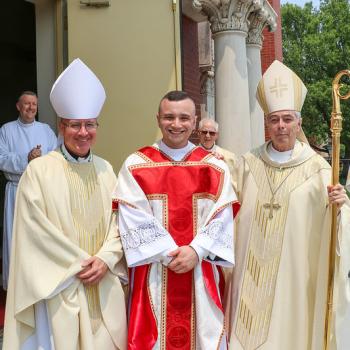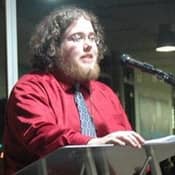It was about a month after I started grad school that I realized I would probably never live in St. Louis again.
At the time, my career path seemed pretty straightforward—I was getting my MFA at the University of Missouri in Kansas City. From there, I would spend another five years or so in the thesis mills of some university getting a PhD. And then . . . well, I hoped I would have a book or two published, and I would go off to some other university and teach there. I hoped for the tenure track, unlikely as that seemed. (One of my favorite professors in undergrad took me aside when I asked him for a letter of recommendation. "If you do this, it needs to be because you want to do it, not because you think you'll have a job at the end," he said. "The odds of achieving tenure aren't much better than the odds of being a professional basketball player.")
But still, I wanted to teach. And I wanted to be a professor. And that meant I had no idea where I would be moving when I got my doctorate. Academics don't generally get to choose a "market area" when they look for positions—they go wherever there's an opening. So, wherever I would end up, it wouldn't be in St. Louis, the city of my birth.
That thought troubled me for a long time.
I am not a solitary practitioner. Indeed, I have a hard time conceiving of what it would even mean to be a solitary Wiccan. (Please don't take offense, my solitary friends—I've never been of the opinion that initiation is the "only proper way." I don't believe in a "one true" anything. Your methods are perfectly legitimate to me, just very at odds with the way I grew up.) I grew up in Coven Pleiades, and I learned everything I know about Wicca from them. More to the point, everything I have done as a Wiccan has been with that group of people (and Sabbatsmeet, the collective name for Pleiades and her sister covens). When I celebrate the sabbats, those are the people I celebrate them with. When I have questions, those are the people I ask. I think it might be fair to say that, more than I am a Wiccan, I am their Wiccan.
I haven't lived in St. Louis for nearly eight years now, ever since I moved away for college. But the thought of joining another coven—or even hiving off to start a daughter coven of my own, which, being a second degree initiate, I could have done—has never crossed my mind. That has had some negative consequences; Kansas City, where I have lived for the past four years, has a thriving pagan community, but I've never gotten very involved in it.
Kansas City is only a few hours away, though—short enough to make the trek home for holidays (though, admittedly, too far for esbats). But what would happen if I ended up going to school somewhere on the coast? What if I found a job, but the job was in Colorado? What would that mean for me as a pagan? What would life be like if, for the first time, I had found myself a solitary pagan?
Then in April I got one of the more depressing letters of my life.
I hadn't been accepted into any of the Ph.D. programs I had applied for. (This was, I should say, my own fault—I should have applied to more programs.) The plan I had in mind for my life had been dashed. I was devastated. I felt adrift, hopeless. The only thing that brought me out of that state, actually, was the offer to write this column.
I always get annoyed when I'm told something like "sometimes the best thing that can happen to you is to not get what you wanted." ("God never closes a door without opening a window," as some say, thus demonstrating that God has no respect for fire safety ordinances.) But they might be right in the case. The same day that this column goes up, I will be starting a new job in St. Louis, the city of my birth, the city of my coven and my family. I could not be happier.
Ironically, during all of the time I have been writing about being a second-generation pagan, I have been separated from the people who defined that experience for me. And at last, I am returning to them—returning to turn the wheel, to draw down the Lord and the Lady, to stand in circle with my hands holding theirs, performing the magick of my strange, bewildering, amazing childhood.
The boxes of books are packed; the carpet of my Kansas City apartment is vacuumed; the persistent stains on the kitchen floor have been abandoned, along with any hopes of recovering the deposit. This time of my life has ended.
By the time you read this, I will be home again. That is as plain a sentence as I have ever written. Yet I can't imagine another I would be happier to write.
1/31/2012 5:00:00 AM





